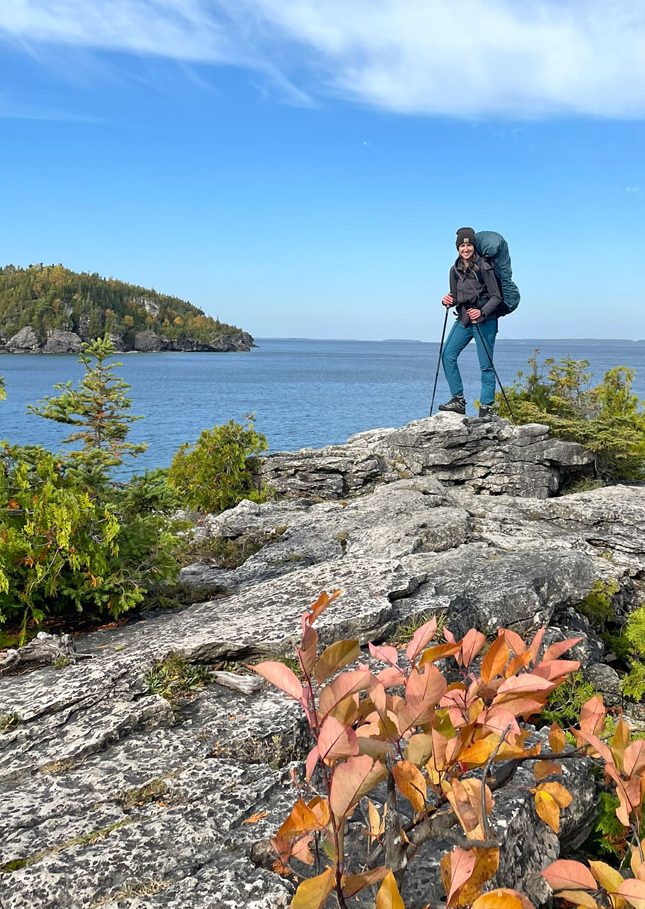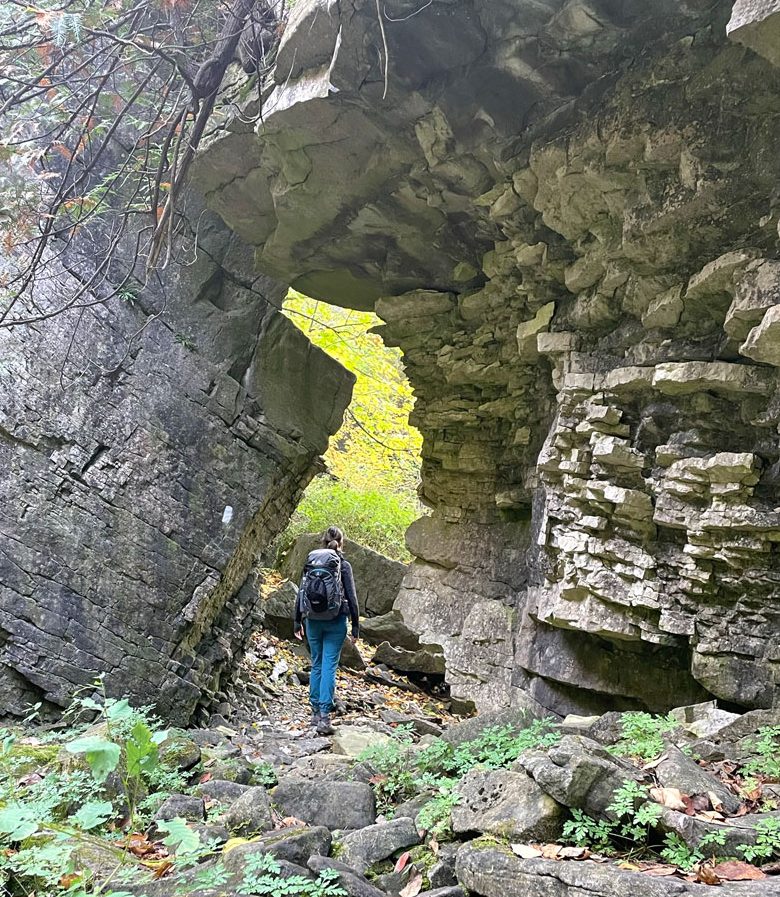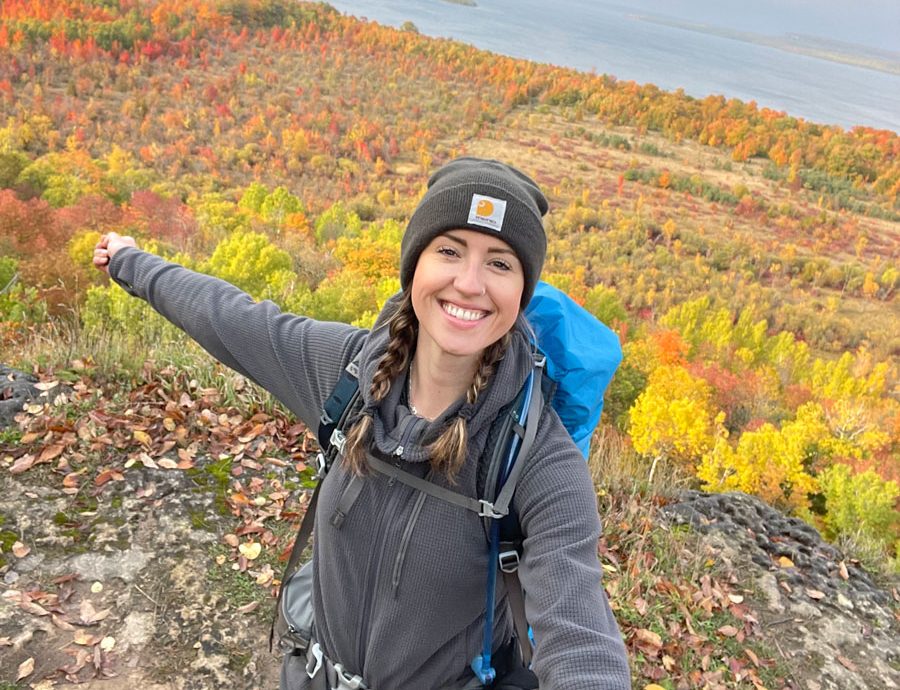HANOVER – It has long been on Olivia Sroka’s bucket list to hike the Bruce Trail end to end, and it has taken a pandemic and mental health breakdown for the 30-year-old to do it.
And now that she has, Sroka is singing the praises of being in nature, setting a goal and accomplishing it, and doing good in the world as ways to improve mental health.
“Nature is the best therapy,” she said in an interview. “Everyone needs a daily dose of blues and greens – sky and leaves.”
Sroka grew up in Rockwood, attended school in Guelph and went off into the world with an environmental studies degree under her belt.
“I’m a big outdoor enthusiast,” she said, explaining why she took a job in Yellowknife in October of 2019.
But she was only there three months when the pandemic hit and everything was shut down.
Without a strong social network, Sroka said the loneliness and uncertainty became unbearable.
“That’s when I had my first experience of mental health struggles,” she said. “I had no support system yet and it was difficult.
“I’m usually a social, outgoing person and I turned into 180 degrees of myself. I became unrecognizable.”
She reached out for professional help, and it did help.
She also worked walking and hiking into her daily routine, which she found hugely beneficial.
Sunshine and fresh air and physical exertion can produce endorphins that make you feel better.
Sroka said connecting with nature helped her feel grounded, connected, and less alone.
In April of 2021 she moved back to Ontario and hoped she’d find her old self again.
It would be another year before that happened.

As her 30th birthday approached, Sroka decided it was time to make headway on her bucket list.
“Hiking had become really important to me,” she said.
“And hiking the Bruce Trail would be a celebration of my mental health journey.”
So she began to plan to hike the Bruce Trail, end to end.
The Bruce Trail is not set up for camping like hikes in Killarney or Algonquin Park.
Many people hike the Bruce in sections. They’ll do a section here and there and over time can cover the entire trail.
Hiking end to end meant Sroka had to organize a place to sleep each night, food for each day, and transportation to and from the trail head.
It took about nine months of planning, but on Sept. 10 she set out from the end of the Bruce near Niagara Falls and on Oct. 21 she arrived in Tobermory – 36 days of hiking 30 kilometres a day, mostly on her own.
She managed to finagle accommodation and rides from family, friends, friends of family, family of friends – and in a few cases, almost complete strangers.
“It was a wide array of people I stayed with,” she said.
“To get this kind of support, and from people I didn’t know, was incredible. To be welcomed into their homes – this was important for my mental health as well.”
She decided this would not just be a journey for herself, however.
Sroka works for the Grey Sauble Conservation Authority and lives in Hanover now.
She decided to turn her hike into a fundraiser for the Canadian Mental Health Association (CMHA) of Grey Bruce, which at the time was promoting its Mood Walk program.
She called her fundraiser “Get Outside and Live Your Trail for CMHA Grey Bruce” and has raised more than $7,300 for the program.
Being on her own for those 36 days gave her time to come face-to-face with herself.

Olivia Sroka nears the end of the Bruce Trail. Submitted photo
“I’m still trying to process it,” she said. “Everything is still sinking in.”
She said the benefit of removing herself from the hustle and bustle of urban life is that she found peace.
“It was a physical challenge for sure,” she said.
“Many times in the day I was only thinking about what I was doing – climbing, walking, resting, fighting the weather. But I never felt so at peace before,” she added.
“It was almost indescribable.”
The most memorable summit was Beaver Valley, she said.
“It’s the top of the escarpment and the fall colours were breathtaking. Every way I turned it was gorgeous.”
Her hiking boots are the worse for wear, but she’ll keep them as a memento of her journey.
Her take-away lessons might sound cliché, but they also might resonate with others.
First, you can do whatever you put your mind to if you set your goals, do the planning, and then do the work, she said.
Second, “nobody is alone in their struggles,” she said.
“Reach out for help – to a friend or a professional. Don’t suffer alone.”
And the third lesson: “nature is the best therapy. It doesn’t have to be expensive and you don’t have to go far,” she said.
“Even 30 minutes a day will help your mental state.”
On its website, CMHA Grey Bruce expressed its gratitude to Sroka for sharing her story and helping to raise funds.
“The Canadian Mental Health Association Grey Bruce is grateful to Olivia and her commitment to supporting local mental health initiatives and appreciates her courage for sharing her story,” states a CMHA media release.
“Olivia’s mental health journey is a reminder to us all that anyone can experience these types of challenges. No one is immune.”




